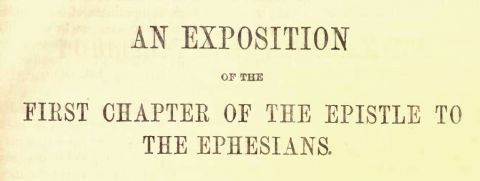 The puritan Thomas Goodwin (1600-1679) wrote a breathtaking commentary on Ephesians: about a thousand dense pages that only cover up through chapter two, verse 11. Before launching into his exposition, Goodwin offers a few remarks about just how great the epistle to the Ephesians is.
The puritan Thomas Goodwin (1600-1679) wrote a breathtaking commentary on Ephesians: about a thousand dense pages that only cover up through chapter two, verse 11. Before launching into his exposition, Goodwin offers a few remarks about just how great the epistle to the Ephesians is.
He quotes Jerome’s comment that Ephesians is “like the heart in the midst of the body,” (quomodo cor animalis in medio est), and says that just as the heart is “the prime seat and fountain of spirits,and the fullest thereof,” Ephesians has everything important in it that you can find anywhere in Scripture. In fact, it has “more of the spirits, the quintessence of the mysteries of Christ,” than can be found anywhere else in the Bible.
And in case you don’t believe Goodwin or Jerome, Goodwin hazards the observation that Paul himself seemed to be aware that he’d written something especially specially special: In Ephesians 3:3, Paul says that a rich treasury of insight into the mystery of the gospel had been given to him, “as I said before.” Goodwin thinks “as I said before” means “up there, the last couple of chapters.”
From there Goodwin turns to some thoughts on Paul’s relationship to the church in Ephesus, first noting that he had declared to them “the full counsel of God” while he was in their city (Acts 26:27). “So, now absent” Paul seems “to have singled out to utter in this epistle the utmost depths of that counsel.”
Why did Paul write his masterpiece (“what he himself esteemed his masterpiece”) to the Ephesians? Goodwin thinks it has a lot to do with the character of the church in Ephesus. He quotes the Greek orator Philostratus as having called Ephesus a city that “excelled all other cities in wisdom and learning, and over-abounded in thousand of learned men.” Some of this genius and curiosity had led the educated class of the city astray, of course, to study magic and esoteric traditions, to their harm. But as Acts 19 records, when they heard the gospel, they renounced those ideas, even to the point of bringing out the books and setting them on fire. This “supereminent self-denial,” muses Goodwin, “might be the reason why God honoured them with an epistle so sublime, by way of recompense.” They were being like Paul, who counted his previous intellectual attainments “but as dung and dogs’ meat, for the excellency of the knowledge of Christ.” Moses too, knew what was to be gained from the best Egyptian education and culture, but renounced it for the sake of God’s revealed truth.